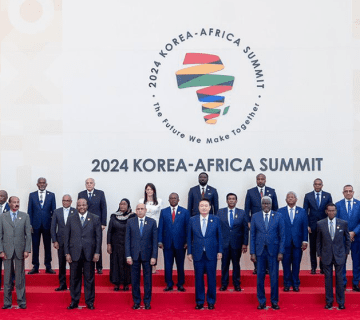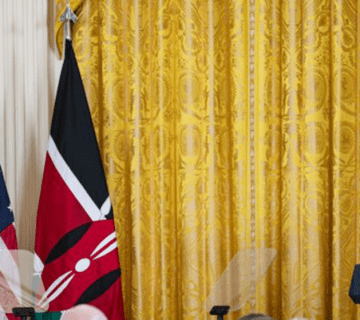On December 29, 2002, after being at the helm of the country’s leadership for 24 years, President Daniel Toroitich Arap Moi handed over the instruments of power to his successor Mwai Kibaki. It was a memorable swearing-in ceremony epitomized by a sense of euphoria and high expectations among the citizenry. That day President Moi exhibited outstanding solidity, humility, and honor as he proceeded to retirement after a long career in public life and leadership spanning half a century. Eighteen years later, on the morning of February 4, 2020, His Excellency President Uhuru Kenyatta made an Official Proclamation of the demise of Mzee Moi. As Kenya, Africa, and the world remembered and celebrated the life of the departed sage, I took some time off to reflect on his governance legacy as the second president and Commander-in-Chief of the Defence Forces of the Republic of Kenya.
I contend that ‘security,’ ‘stability’ and ‘statecraft’ are three vital defining features of the Moi Administration, the positive attributes of which we ought not to lose as a county. It may be recalled that the late 1970s and early 80s were volatile years in many parts of the African continent and elsewhere in the world. Military coups and countercoups were all too common while national security and stability were luxuries enjoyed in a few countries. These were the early years of the Moi presidency. His political mentor Mzee Jomo Kenyatta had passed on in August 1978 leaving him to take up the country’s leadership amidst such volatility and uncertainty.
The first step President Moi took was to ‘wear the shoes’ of his predecessor. Subsequently, he declared the Nyayo Philosophy of Peace, Love and Unity, reiterating that he was following in the footsteps of Mzee Kenyatta. Afterwards, he released all political detainees and exhibited an early passion for education and environmental conservation. He decreed against female genital mutilation, encouraged boarding schools for girls and personally partook in tree planting exercises around the country.
Yet, it was not long before President Moi came face to face with the bitter intricacies of the abacus of power and the thin line that divides predictable stability on one hand and uncontrollable chaos on the other. The failed coup attempt of August 1982 was one such lesson. Perhaps, that was why he resolved to handle matters of national security and governability with utmost dedication and unmatched zeal thereafter. In this direction, he convinced parliament to make a number of constitutional amendments that would help materialize this outlook. Between 1982 and 1986, Parliament passed several important Amendments including that of Section 2(A) and 111, among others. This, in turn, afforded the Presidency more legal and authoritative latitude in the management of the country’s security and administrative realms. Armed with effective and versatile instruments of governance, President Moi ensured a steady regime outlook that yielded a fairly stable and secure outlook. A well-thought-out blend of patron-client networks within a party-centralist and administrative hegemonic regime became the vital ingredient of the governance recipe.
The Assistant Chief would randomly order youths to tidy up littered spaces while the young would quickly stand up at the Matatu termini for older citizens to take the seat. These were the years of the Chief’s Baraza, the Provincial Administration, the District Focus for Rural Development programme, weekly Harambees, the no-nonsense Agricultural Extension Officer, Nyayo Milk, Nyayo Wards, Nyayo Tea Zones, Maendeleo ya Wanawake, the Loyalty Pledge, and a sharp national security apparatus. Critics of the Moi Administration maintain that this was all too harsh and only for regime sustenance and survival. Indeed, it had its downside, epitomized by the externalities of a constricted socio-political space and a host of macroeconomic challenges. Nonetheless, a keener look at the bigger picture reveals an aura of forthrightness in the management of a state’s affairs – one that premised on the tact of statecraft. True enough, as the decade of the 1980s came to a close and that of the 90s set in, many a regime around the world that had been sustained for decades on the Cold War strategic chessboard begun to crumble. Some that had carelessly traded one superpower against the other for purposes of blindly clinging-on to power not only collapsed but were soon plunged into the abyss of state failure, protracted civil wars, and unmanaged governance vacuums thereafter.
It was during these years that the clamour for political pluralism in Kenya was heightened. President Moi read the signs of the times on the local and international scene with great foresight. He then took the initiative to convince the ruling party and parliament to repeal section 2(A) of the Constitution in 1991, thereby ushering in a new age of multipartyism, one that broadened the political space and opened new theatres of participation in governance. When his party’s candidate Uhuru Kenyatta (who was elected President a decade later in 2013) lost and promptly conceded defeat in 2002 General Elections, President Moi surprised many by wilfully and peacefully handing over the reins of power thereby setting the country on a trajectory of stability and predictability as a transitioning democracy of the 21st Century.
Nonetheless, a discussion of the Moi administration would be incomplete without making reference to his conduct of statecraft. Many commentators would agree that the late Mzee Moi was highly respected on the international scene, especially when it came to his role in Kenya’s diplomacy of conflict management, not only within the immediate Eastern and Central Africa sub-region, but also elsewhere on the continent and beyond. He handled highly contentious matters on the global scene with great tact while leading numerous good office delegations, initiating and facilitating delicate mediation processes and projecting Kenya’s image on the world stage through international peacekeeping, regional integration, the war on terrorism, promotion of sports, wildlife protection, and tourism. This disposition earned Kenya more friends than enemies even in the most volatile contexts on the international scene. Considering that the art of statecraft and the management of the national security realm of a state never was and never will be a simple task, I submit that President Moi’s is a rich legacy in this respect.
Therefore, as we learn from our governance missteps of the past, consolidate our democratic gains, build our institutions and cement our nationhood we must not disregard the positive utility of such attributes; for without order and stability, enjoyment of the fruits of liberty and the gains of development is impossible.
Dr. Mumo Nzau is a National Security and Governance Strategist as well as a member of the HORN Council of Advisors



